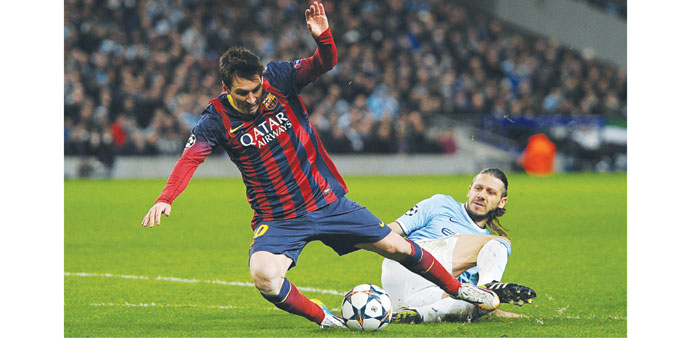File photo of Manchester City’s Martin Demichelis tackling Barcelona’s Lionel Messi during a Champions League match.
Jacob Steinberg, theguardian.com/London
No matter how many times the incident was replayed, no one could be certain beyond doubt that Sergio Ramos had fouled Neymar in last month’s Clasico. Some people, squinting hard and slowing down the replay as much as possible, claimed that they could see the slightest of touches from Ramos, while others insisted that Neymar had made the most of what was minimal contact at best and conned the referee. Even after countless viewings, the evidence was inconclusive.
For Alberto Undiano Mallenco, who only had a split second to make up his mind, the decision was simple once he blew his whistle and awarded Barcelona a penalty. He had no choice but to send off Ramos, Lionel Messi made it 3-3 from the spot and what had been one of the season’s most thrilling games turned into an exercise in attack versus defence as Real’s 10 men attempted to cling on to a point that would have kept them in first place. Real cracked in the end and another debatable penalty from Messi secured a 4-3 victory for Barcelona.
Of course, it is not part of Undiano’s remit to ensure a game is entertaining and to suggest otherwise would be abject bunkum. As much as Undiano may have wanted to prolong the entertainment for the watching public, referees are constrained by the laws of the game and must operate within those boundaries. A kind-hearted maverick who attempts to break free, sparing players like Ramos in order to improve the match as a spectacle, would only invite sanction from his superiors.
FIFA’s laws currently state that a red card must be awarded for “denying the opposing team a goal or an obvious goalscoring opportunity by deliberately handling the ball (this does not apply to a goalkeeper within his own penalty area)” and “denying an obvious goalscoring opportunity to an opponent moving towards the player’s goal by an offence punishable by a free-kick or a penalty kick”.
There is no desire to be critical of the authorities on this issue, although pundits often call for referees to apply common sense, which is impossible when the wording of a law does not allow it and in most cases, that is preferable.
Yet perhaps there are modifications that can be allowed that will ensure that offending players are not punished as excessively as Wojciech Szczesny was during Arsenal’s defeat by Bayern Munich, the goalkeeper making a genuine attempt to stop Arjen Robben from beating him but finding that the Dutchman was too quick. There was little that Szczesny could do once Robben had gone round him.
It is harsh for ineptitude or clumsiness to be penalised so severely. Football is a contact sport but Neymar was wise enough to exploit the situation, well aware that a defender is always on dodgy ground in those situations. Yet it still felt a shame for Ramos to be sent off, a punishment that did not appear to fit what was a pretty innocuous crime when taken out of context.
That said, sympathy cannot be afforded to Martn Demichelis, who was sent off in similar circumstances during Manchester City’s defeat by Barcelona a day before Szczesny’s dismissal. Demichelis knew that he had no realistic chance of stopping Messi legally once the Barcelona forward was in the clear but the foul that he committed inches outside the area revealed that he was perfectly happy to concede a free-kick and then bank on City holding out with 10 men. As it transpired, his plan fell flat when a penalty was awarded anyway and Demichelis deserved his red card for unsporting behaviour indeed.
While UEFA is not willing to go that far, it has been pondering whether a red card for denying a goalscoring opportunity is fair and Michel Platini has argued that goalkeepers who commit last-man offences should not be sent off. “It seems excessive,” UEFA’s president said. “The penalty is itself already punishment enough. I think it’s something that everyone in Fifa and Uefa agree but one or two of the countries that make up the International Board are unwilling to change.”
But should defenders be exempt too? Some say that a foul in the penalty area should not be a red card the penalty is enough. One way to stop defenders being rewarded for that calculated gamble is to introduce a law that they are not shown a red card for denying a goalscoring opportunity in the area, as long as the penalty is scored.
But the problem that may arise then is that the penalty will deliberately be missed in order to reduce the other side to 10 men.
Then again, maybe we should have more faith in our footballers and would it really be worth passing up the chance to score an important goal? Could you imagine Messi intentionally missing at the Bernabu with Barcelona trailing 3-2 with 25 minutes to go? This is worth conducting a trial on.
Or we could just keep everything the way it is now if you like seeing matches ruined in the name of the law, that is.

